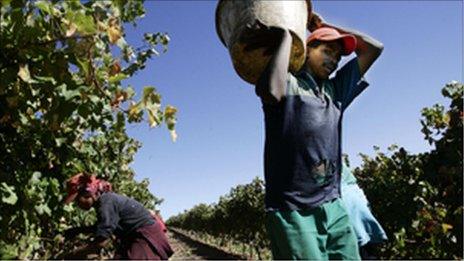The wine grown in a South African township
- Published
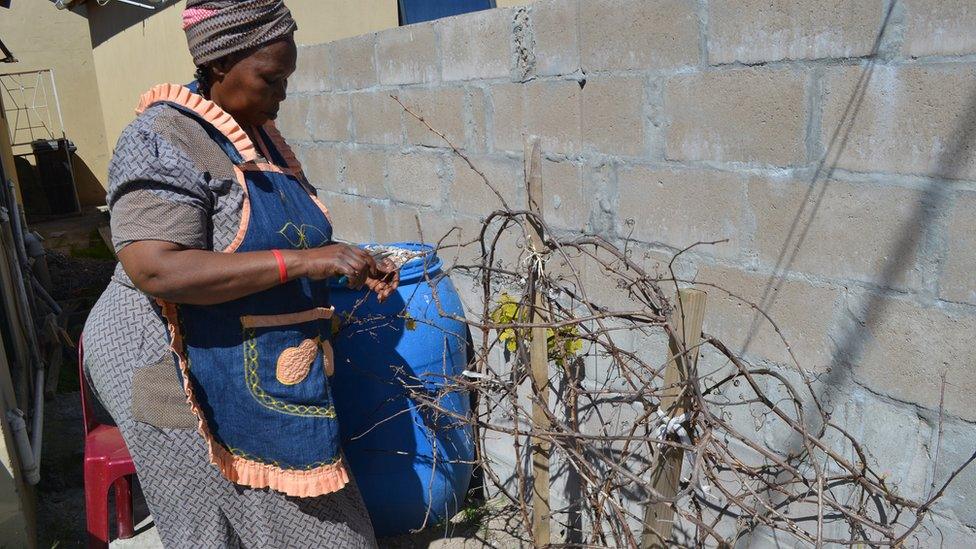
Judith Xabanisa looks after her grape vines all year round so she can get the best grape from them
Judith Xabanisa is one of a handful of women growing grapes in the heart of Nyanga-East, a South African township on the edge of Cape Town.
It is part of the Cape Flats, an area notorious for drugs and crime - but Ms Xabanisa hopes to use wine to help change this neighbourhood's reputation.
"I've always enjoyed farming but I never thought I'd be growing grapes. It feels good to be doing something different," she says, smiling.
"Growing grapes here is still strange for some people but most are just curious about how they will turn out."
The 64-year-old is a grower for Township Winery - a black-owned wine company.
The idea of planting grapes here came about in 2009, the soil was tested and found to be suitable, and the first commercial vines were then planted in the area, the company's spokesperson Nomhle Zondani tells me as we walk through the township.
"Vines take about five years to mature, so we had to find women who would understand the commitment needed to see this through," she says.
"We had to explain to the community that this is not going to bring easy money - that the success would come once we harvest."
Ms Zondani says one of the biggest challenges has been ensuring that there's a steady stream of growers - because there are no immediate returns.
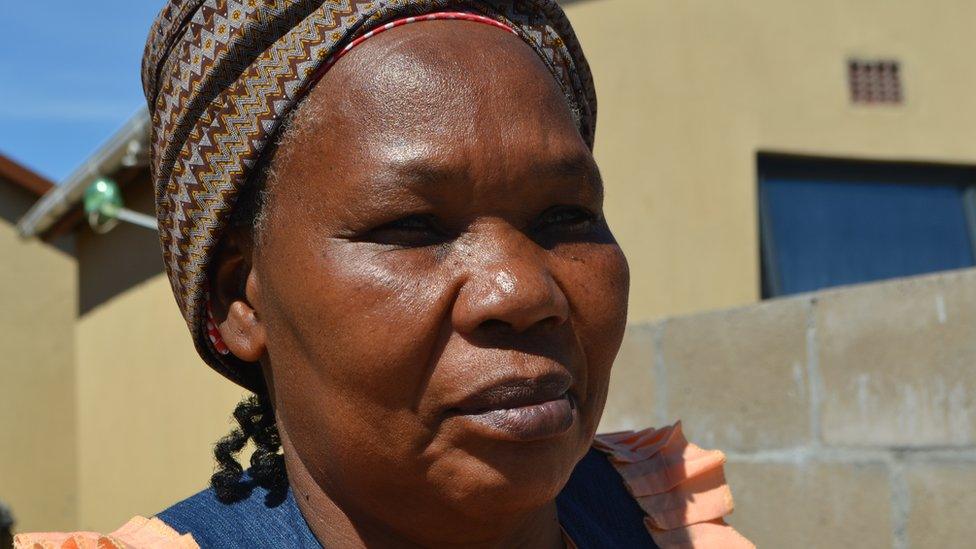
Judith Xabanisa hopes she will soon reap the rewards of her work
But Ms Xabanisa says this project is giving her something to do. Sitting in a green plastic chair pruning her vine, she tells me that many people here are dependent on government grants. The elderly women says she wants something different for her family.
"I am hoping to pass on the skills I have learned to my four children and grandchildren so they don't end up in the streets or as criminals," she says.
Ms Xabanisa hopes this is the beginning of a family business, where they can be owners and not just workers.
Elite?
South Africa's wine industry dates back to the 17th Century with the arrival of the settlers from Europe.
Fast forward to 2015 and the industry is still mainly white-owned, with most black involvement limited to providing the labour.
Since the advent of democracy and with mounting calls for the industry to be more racially representative, sprinkles of black farmers are now making it into the fold.
But many still consider wine a drink to be enjoyed by the white elite, something Township Winery hopes to change - even if just in Cape Town.
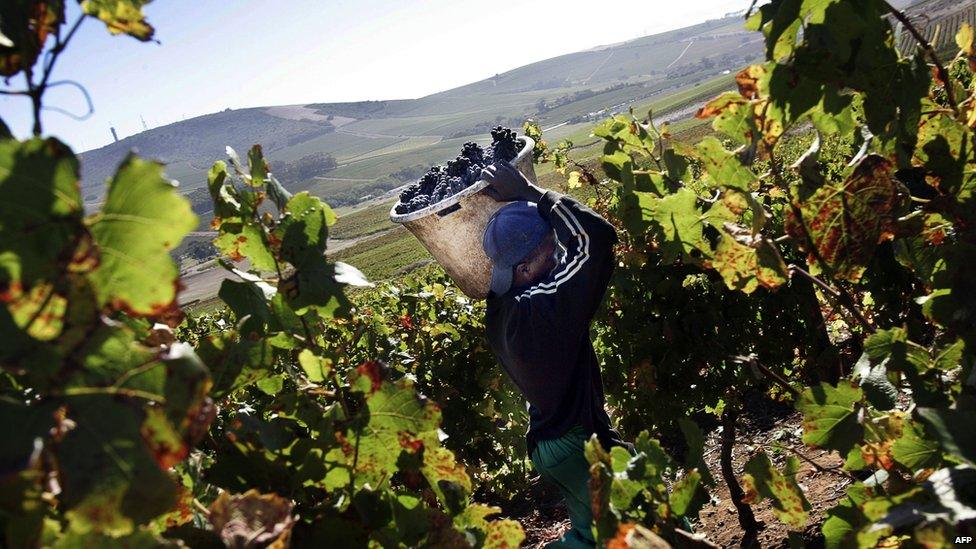
South Africa's wine industry is world-acclaimed
According to a 2014 study, external, commissioned by the SA Wine Industry Information & Systems (SAWIS), which compiles statistics on the industry, South Africa ranks as seventh largest producer of wine in terms of volume - contributing 4.2% of the world's wine.
But this multimillion dollar industry largely benefits older and more established companies who have more resources to claim a bigger share of the market.

South Africa's wine industry
South Africa it 7th largest wine producer in the world
Wine farms cover some 100,000 hectares in South Africa
Turnover was 36.1bn rand ($2.4bn; £1.6bn) in 2014 - 1% of GDP
Total exports of wine were 422.7m litres in 2014
Some 300,000 people are employed in the industry both directly and indirectly
The wine industry is predominantly owned by white people
The very first vineyard planted in South Africa coincided with the arrival in southern Africa of settlers from Europe in the 1650s
Sources: SA Wine Industry Information & Systems (SAWIS), Department of Agriculture, Fisheries and Forestry

Township Winery's success hinges on partnering with some of the more established companies.
Once their grapes leave their township, they are driven to a bottling plant in Stellenbosch, a 30-minute drive from Cape Town.
Here their grapes are mixed with produce from some of the best vineyards - to create a unique blend.
I notice that the region is a stark contrast to the dry streets of Nyanga - here the vines of South Africa's most established wine companies sprawl for kilometres on end.
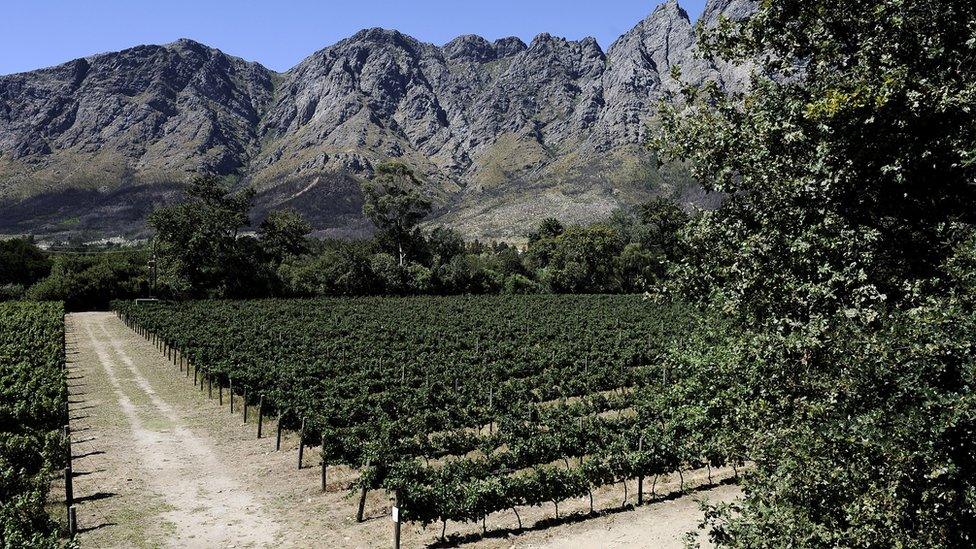
South Africa's vines cover 100,00 hectares of land, most of which is in the Western Cape Province
Ms Zondani says they hope to one day replicate the large-scale farming model in the township - and create even more jobs.
"Before the resettlement of people in the 1960s, the Cape Flats had vineyards. All of them are gone now but the soil is still fertile. We want to bring this part of Cape Town back to its former glory," she says.
At the height of white-minority rule, people of colour were not allowed to own land.
Through policies such as the Group Areas Act, they were dispossessed of their land and moved to "black areas". The resettlements were also a way of enforcing racial segregation.
"If we fail, we would have failed the townships that we come from. Many communities are depending on us to make history," she says.
Shifting sands?
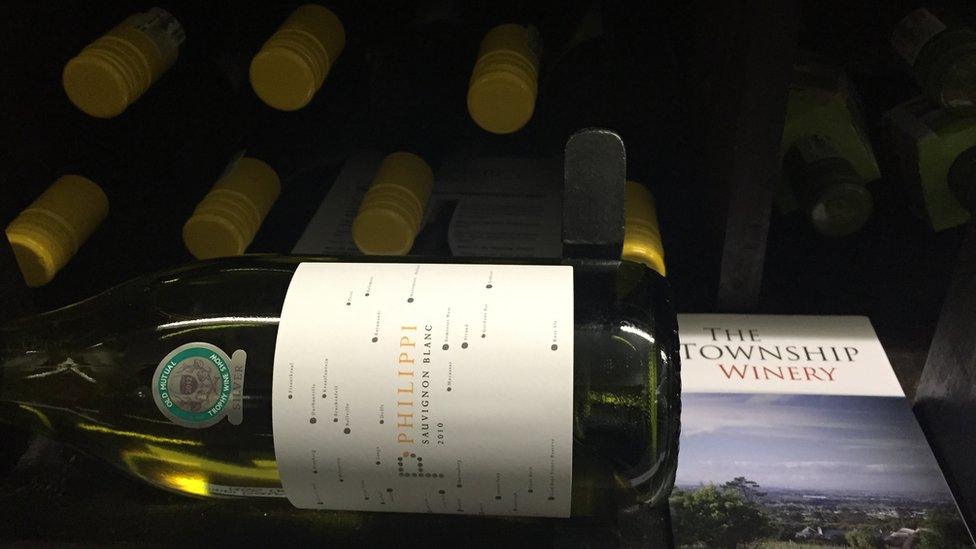
Township Winery wants to expand its range but has found success with its white wine
Despite their challenges, word is slowly spreading about the township wines.
The most popular is the Philippi wine, a sauvignon blanc, says Nkosi Madotyeni, who manages the Roeland Liquors shop in the heart of Cape Town.
"It's quite popular here - people come the store just for the wine," he said.
"Many people can't believe that something of this great quality came from a group of women with nothing. Its absolutely amazing."
Mr Madotyeni believes the wine will change stereotypes about the local wine industry - and even about the community of the Cape Flats.
"Wine is seen as something for white people, this township wine is showing many here that things are changing slowly but surely. Its inspiring to watch."
Back in Nyanga, Ms Xabanisa hopes more doors open for women like her in this line of business. She hopes that what started as a project in backyards will leave a lasting legacy for her loved ones and her community.
- Published26 November 2012
- Published15 June 2012

- Published23 August 2011
